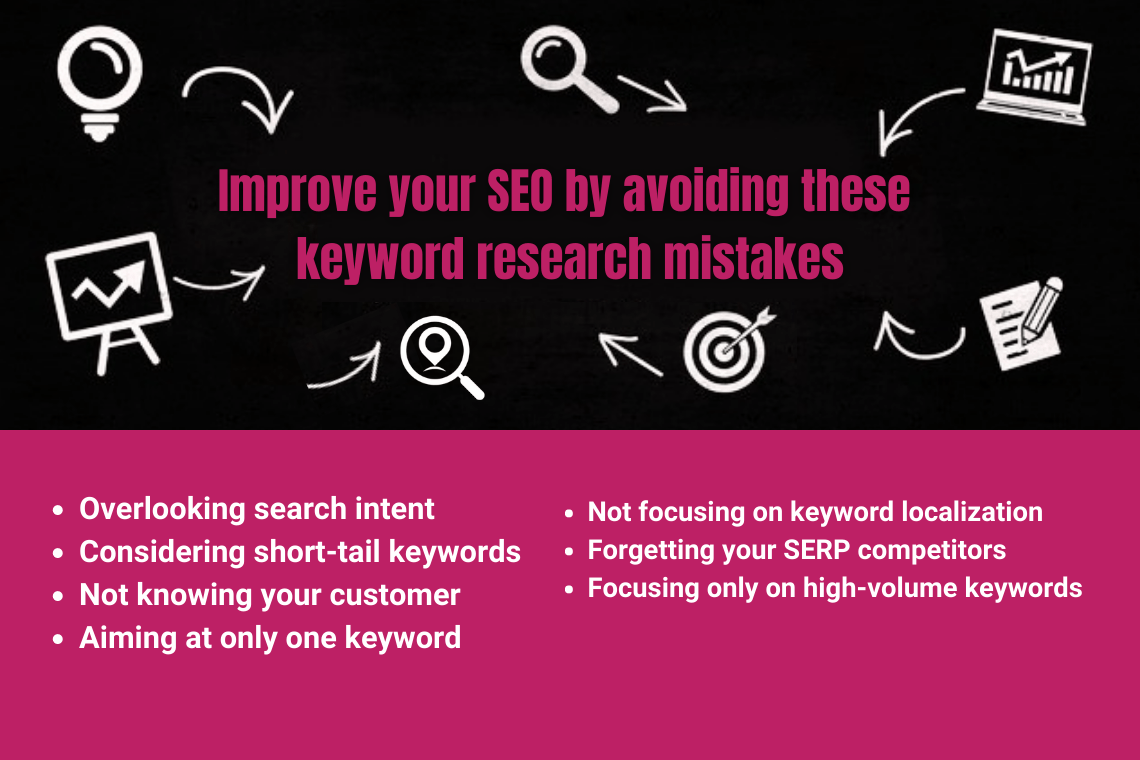What we cover in this blog?
- SEO Keyword research and its importance
- 7 SEO keyword research mistakes to avoid
- Overlooking search intent
- Considering short-tail keywords
- Not knowing your customer
- Aiming at only one keyword
- Not focusing on keyword localization
- Forgetting your SERP competitors
- Focusing only on high-volume keywords
- Conclusion
Every web search begins with a keyword either by typing in the search box or using a voice search. The search engines will return the most relevant results based on the user query. Therefore, for creating a successful SEO for your website, it is essential to optimize your content with the right keywords. This helps to acquire a targeted audience for your site through search engines.
SEO Keyword research and its importance
SEO marketing campaigns kick start with the right keywords, hence keyword research in SEO is very important for boosting your rankings and search traffic. Keyword research means to discover words called ‘keywords’ that users will search in search engines to get relevant results from search queries.
A keyword is also termed as a search term and is the initial step for developing successful SEO for your business. It could be one or more words or phrases. Keyword research influences every task that you perform on your SEO, for example, on-page SEO, finding content topics, link building and content promotion etc.
For example, if you have chosen the wrong keywords that are not related to your content then this may misguide users thus lowering your overall rankings. Further, it will increase your site’s bounce rate and it may lead to losing potential users. Therefore, researching keywords helps you understand your target audience more effectively.
7 SEO keyword research mistakes to avoid
Check out these seven SEO keyword research mistakes that you should avoid for improving your SEO performance.
1.Overlooking search intent
User’s search intent is more important to optimize your content than focusing on how many users are searching a specific keyword. The keywords you use should be related to the intent of the people searching for that particular content. Understanding the audience will help you figure out what users are searching for to make your content the best option for them.
2. Considering short-tail keywords
Short-tail keywords are short, one-word keywords that are often initially used when discovering the content to write. However, focusing on short-tail keywords alone will result in poor results. Using more specific long-tail keywords ensures you cover a topic more widely and attract the audience with the content they will be more likely to convert.
3. Not knowing your customer
In any digital marketing strategy understanding your customer is one of the very first things you should do. Especially for keyword research, you should segment your customers by creating buyer personas. There are many other channels that users use as search engines.
Buyer personas help you to choose more targeted keywords and thus make your content more relevant to your customers. Pay attention to user’s different preferences.
4. Aiming at only one keyword
Working towards a single keyword could limit your reach as different users may phrase their search queries differently thus fail to rank for similar keywords. Frequently using the same keyword and optimizing for just one keyword could lower your SEO ranking. Instead of targeting one keyword, select the most searched key phrase, its synonyms and phrase them as related key phrases.
5. Not focusing on keyword localization
Keyword localization that is using keywords based on location, is necessary to improve the global success of a website. Customers in different locations do not use the same keywords when searching for a product. A strategic plan to localize your products or marketing campaigns can help you build a bridge to your targeted audiences and boost your brand in local markets.
6. Forgetting your SERP competitors
Analyzing competitor’s ranked keywords can help you determine the gaps in their current content that you could fill to boost your SEO ranking. It also gives you clues on what similar buyers are looking for and also lets you know current trends. Competitive research can also help in identifying the keywords you haven’t considered.
7. Focusing only on high-volume keywords
Targeting on high-volume keywords would often ignore user intent. These keywords are highly competitive and it’s tough to stand out using the same keywords as others. Start writing content for mid-volume keywords that match search intent and are easier to rank.
Conclusion
A lot of factors contribute to a site’s SEO success, of which the most important factor is keyword research. Successful keyword research takes effort and careful planning.
If you are concerned about your website’s SEO or rankings, check out our SEO Strategy and Services. Our leading digital marketing agency is a one-stop solution for your multiple problems. Contact us today to get a quote on our SEO Services.

Durga
About The Author…
Durga has a master’s degree in engineering. Technological advances in digital space interest her a lot. Digital marketing is her forte and she passionately follows latest trends in the digital marketing space. She has written many trending articles on various social media platforms. Her areas of interest include SEO Optimization, structured data, SMM, Keywords research and analysis etc. She is focused, resourceful and dedicated.


